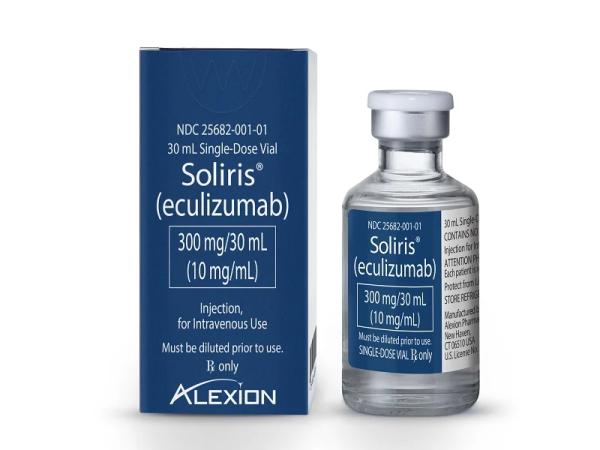Eculizumab Disease Interactions
There are 5 disease interactions with eculizumab.
Eculizumab (applies to eculizumab) meningococcal infections
Major Potential Hazard, Moderate plausibility. Applicable conditions: Infectious Diarrhea/Enterocolitis/Gastroenteritis
Eculizumab is contraindicated in patients with unresolved serious Neisseria meningitidis infection, in those who are not currently vaccinated against Neisseria meningitidis, unless the risks of delaying treatment outweigh the risks of developing a meningococcal infection. Life-threatening and fatal meningococcal infections have occurred in patients treated with eculizumab. The use of eculizumab increases a patient's susceptibility to serious meningococcal infections (septicemia and/or meningitis). Closely monitor patients for early signs and symptoms of meningococcal infection and evaluate patients immediately if an infection is suspected. Meningococcal infection may become rapidly life-threatening or fatal if not recognized and treated early. It is recommended to discontinue eculizumab in patients who are undergoing treatment for serious meningococcal infections.
Immunosuppressive agents (applies to eculizumab) infections
Major Potential Hazard, Moderate plausibility. Applicable conditions: Infection - Bacterial/Fungal/Protozoal/Viral
Serious and sometimes fatal infections have been reported in patients receiving immunosuppressive agents. Patients receiving immunosuppressants are at increased risk of developing bacterial, viral, fungal, and protozoal infections, and new or reactivated viral infections including opportunistic infections. Caution should be exercised when considering their use in patients with severe or chronic infections. It is recommended to interrupt therapy in patients who develop a new infection while undergoing treatment and to monitor these patients closely for any sign or symptom indicative of infection.
Immunosuppressive agents (applies to eculizumab) PML
Major Potential Hazard, Moderate plausibility. Applicable conditions: Immunodeficiency
Immunosuppressive agents may increase the risk of progressive multifocal leukoencephalopathy (PML). Certain agents are contraindicated in patients who have or have had PML. Patients receiving chronic immunosuppressant or immunomodulatory therapy or who have systemic medical conditions resulting in significantly compromised immune system function should not be treated with these agents. Health care professionals should monitor patients for any new sign or symptom suggestive of PML. Therapy dosing should be withheld immediately and an appropriate diagnostic evaluation should be performed at the first sign or symptom suggestive of PML.
Eculizumab (applies to eculizumab) thrombotic microangiopathy
Moderate Potential Hazard, Moderate plausibility. Applicable conditions: History - Thrombotic/Thromboembolic Disorder
Thrombotic microangiopathy (TMA) complications have occurred after treatment discontinuation or after a missed dose of eculizumab. It is recommended to monitor patients with atypical hemolytic uremic syndrome for signs and symptoms of thrombotic microangiopathy (TMA) complications for at least 12 weeks. If TMA complications occur after eculizumab discontinuation, consider reinstitution of treatment, plasma therapy or appropriate organ-specific supportive measures.
Eculizumab (applies to eculizumab) vaccination
Moderate Potential Hazard, Moderate plausibility. Applicable conditions: Immunodeficiency, Neutropenia
Eculizumab blocks terminal complement activation; therefore, patients may have increased susceptibility to infections, especially with encapsulated bacteria. Caution is advised when using this agent in immunocompromised and neutropenic patients as Aspergillus infections may occur. It is recommended to administer vaccinations for the prevention of Streptococcus pneumoniae and Haemophilus influenza type b (Hib) infections according to the Advisory Committee on Immunization Practices (ACIP) guidelines and to use caution when administering to patients with any systemic infection.
Switch to professional interaction data
Eculizumab drug interactions
There are 107 drug interactions with eculizumab.
More about eculizumab
- eculizumab consumer information
- Check interactions
- Compare alternatives
- Reviews (8)
- Side effects
- Dosage information
- During pregnancy
- Drug class: selective immunosuppressants
- Breastfeeding
- En español
Related treatment guides
Drug Interaction Classification
| Highly clinically significant. Avoid combinations; the risk of the interaction outweighs the benefit. | |
| Moderately clinically significant. Usually avoid combinations; use it only under special circumstances. | |
| Minimally clinically significant. Minimize risk; assess risk and consider an alternative drug, take steps to circumvent the interaction risk and/or institute a monitoring plan. | |
| No interaction information available. |
See also:
Further information
Always consult your healthcare provider to ensure the information displayed on this page applies to your personal circumstances.


